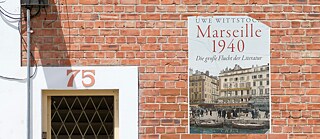When the Wehrmacht invaded France in May 1940, some of Germany's best-known artists were forced to flee for a second time in exile. The writer and journalist Uwe Wittstock tells the story of their fates in a sensitive and gripping way.
The Varian Fry Street in Berlin-Tiergarten is inconspicuous. Barely a hundred metres long, a steak restaurant, the side entrance to a large cinema and a bus stop. Many passers-by are probably unfamiliar with the man who gave the street its name. An information board helps them – they learn while waiting for the bus: From July 1940, “Varian Fry helped over 1,500 people escape from the south of France within 13 months”. It is an irony of fate that the name of the man whose commitment saved the lives of some of the most important German artists and intellectuals of the 20th century is almost forgotten in Germany today: Hannah Arendt, Max Ernst, Lion Feuchtwanger Heinrich and Golo Mann – they were all among the clients of Varian Fry and his Emergency Rescue Committee (ERC).In Marseille 1940 – Die große Flucht der Literatur (Marseille 1940 – The Great Flight of Literature), Uwe Wittstock has created a monument to the work of this network of volunteer escape helpers, who often risked their own lives in their endeavours. The book tells of the gruelling everyday life of persecuted people in Nazi-occupied France. And it sheds light on the enormous efforts required to escape the clutches of the Gestapo, which stretched across almost the whole of Europe. Prominent German exiles are at the centre of the story, but Marseille 1940 is dedicated to the millions of unknown refugees of the time: “The fates reported here are therefore intended to represent all those of whom we know too little to be able to tell about them.”
On the back seat with Lion Feuchtwanger
Wittstock uses the testimonies of his protagonists as a basis. He consulted a large number of letters and diaries, biographies and interviews in order to reconstruct a panorama of collective memory. The author skilfully combines all these fragments into an overarching narrative, creating an arc of suspense that encourages readers to read on quickly. Nothing is invented, only the transitions between the individual documented events are sometimes designed with artistic freedom. This genre is known as narrative nonfiction. It is characterised by a scenic narrative style that places the reader close to the historical figures whose lives are traced.We accompany the physically ailing Franz Werfel on his march across the Pyrenees to the Spanish border or sit with Lion Feuchtwanger – disguised as an old lady – in the back of a diplomat's car on his escape from an internment camp in the south of France. We share in the imponderables associated with every day of the seemingly hopeless life on the run. Yawning boredom in the face of the infinitely slow grind of bureaucracy can be abruptly interrupted at any time by existential threats. Coincidences often decide between life and death. Max Ernst fortunately meets a border official who has more respect for surrealist art than for the Gestapo's wanted lists. Walter Benjamin, on the other hand, crosses the border – with a briefcase under his arm containing his last manuscript – after an arduous journey on a day when the laws are interpreted particularly strictly. He was refused permission to continue his journey because he did not have an exit visa. Repatriation to France was imminent. Faced with the threat of extradition to the Secret State Police (Gestapo), Walter Benjamin took his own life. What happened to the manuscript is still unclear today.
A plea for humanity
Wittstock's book is remarkable in that it breaks down world-historical events to an individual, interpersonal level. Equipped with a list of prominent names to be taken out of the country, Varian Fry finds a more complicated reality a few weeks after the invasion of the German Wehrmacht in southern France. His committed team examines each individual case in need of help and tries to find individual solutions. They provide those waiting with financial resources, take care of obtaining papers and research safe routes across the border. As they repeatedly help politically undesirable refugees in the anti-communist USA, they incur the wrath of the American authorities, who fear for national security. In the end, they had to give in to political pressure and stop their work – even though they enjoyed the personal support of First Lady Eleanor Roosevelt.Despite the political circumstances, their work was repeatedly made easier by sympathetic French officials, who sometimes turned a blind eye. More essential, however, was the solidarity of ordinary people, who made small gestures to help those persecuted by Nazi Germany. “Without the help of these French people, without their courage to take in and hide strangers, no refugee could have survived in France for more than a few weeks.” Marseille 1940 is therefore above all an impressive testimony to humanity under inhumane conditions.
Uwe Wittstock: Marseille 1940 – Die große Flucht der Literatur.
München: C.H. Beck, 2024. 351 p.
ISBN: 978-3-406-81490-7
You can find this title in our eLibrary Onleihe.
München: C.H. Beck, 2024. 351 p.
ISBN: 978-3-406-81490-7
You can find this title in our eLibrary Onleihe.
July 2024
